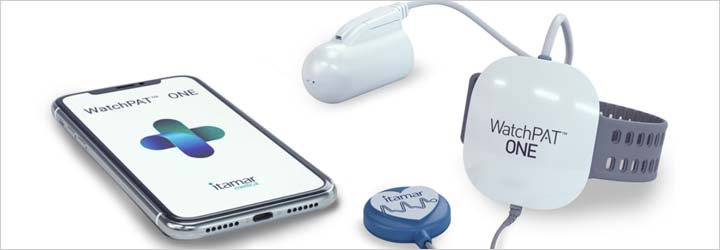Could You Have Sleep Apnea? 3 Things to Consider
Obstructive Sleep Apnea (OSA) is a condition characterized by pauses in breathing while you sleep. It usually occurs when the soft tissue in the rear of the throat collapses and the airway is blocked. Throughout the night as an individual struggles to breathe, they repeatedly leave deep sleep and partially awaken as they gasp for air. However, when morning comes they are unaware of their sleep disturbance. According to the National Sleep Foundation, sleep apnea affects somewhere between 10-30% of adults.
Symptoms and risk factors
OSA symptoms may first be noticed by another person, like snoring loudly (although not everyone who snores has sleep apnea), gasping for air, and moments when you stop breathing during sleep. Other symptoms can include headaches, daytime sleepiness, and waking up with a dry mouth.
The risk factors for the disorder include being overweight, male, and more than 40 years of age; but the disorder can affect anyone (even small children whose breathing may be obstructed by enlarged tonsils). Unfortunately, most sufferers are unaware that they have the disorder, so it often remains undiagnosed. But ignorance is not bliss.
Untreated obstructive sleep apnea can cause a host of serious medical problems including chronic tiredness, headaches, memory lapses, irritability, weight gain, depression, increased sensitivity to body aches and pain, and for postmenopausal women, an increase in joint pain. It also places sufferers at a higher risk of developing heart disease, stroke, and high blood pressure.
Finally, excessive sleepiness has public safety consequences: The American Automobile Association (AAA) estimates that one out of every six (16.5%) deadly traffic accidents, and one out of eight (13%) crashes requiring hospitalization of car drivers or passengers is due to drowsy driving.
Diagnosis and treatments
If you suspect you may have sleep apnea, you shouldn’t delay an evaluation. A good place to start is the Epworth Sleepiness Scale. It asks Eight Questions to assess your risk – if your score is equal to or higher than 10, you are at high risk for sleep apnea and should consult your provider. At The Kaplan Center, to help us detect sleep apnea, as well as providing markers for quality of sleep, we prescribe our patients a recyclable Home Sleep Apnea Test called the WatchPAT ONE (scroll down for more information).
Although there is no cure, there are steps you can take to help you get a more restful sleep. Here are 3 things to consider doing now:
- Examine your lifestyle factors. Weight loss and/or maintaining a healthy weight, eliminating alcohol, and smoking cessation have all been shown to improve sleep. A one-step-at-a-time approach for any major lifestyle modifications will help you maintain these healthier practices for life.
- Consider trying a mouthpiece. Patients diagnosed with mild to moderate sleep apnea may benefit from using an oral appliance. These are customized mouthpieces that are meant to reposition your jaw and/or tongue, depending on the specific device, to help keep your airway passage open while you sleep. If you think this may be a good fit for you, speak to both your healthcare provider and dentist for more information.
- If you have been diagnosed with moderate-to-severe sleep apnea, a CPAP (continuous positive airway pressure) machine may be recommended by your provider. The machine uses a mask that fits over the mouth and nose, or just the nose, and gently blows air into the throat. The pressure from the air helps keep the airway open during sleep, minimizing disturbances due to sleep apnea.
Again, if you think you may be suffering from sleep apnea or another type of sleep disorder, don’t put off seeking help. Your sleep is very important, and we are here to get you back on track. Call us at 703-532-4892, ext. 2 to make an appointment.
WatchPAT® ONE for Diagnosing Sleep Apnea and Other Sleep Disorders
WatchPAT ONE Home Sleep Apnea Test (HSAT) can be a valuable tool to help us monitor if there are adequate amounts of Deep and REM sleep, apnea episodes, oxygen and heart rate, snoring, movement, and more.
Patients benefit from:
- Convenience. WatchPAT ONE utilizes Bluetooth technology which allows patients to pair the device to their smartphone using Itamar’s proprietary app. Sleep study data is collected during the test and automatically sent to a secure, cloud-based server. Once the test is complete, a comprehensive report is automatically generated and sent directly to the prescribing physician.
- An accelerated diagnosis. The sooner we have your data the sooner we can devise a treatment plan to improve your sleep.
- Less travel. Patients do not need to come into our office to pick up or return their equipment.
- A safe, hygienic product. Using a fully disposable product cuts down on the concern of spreading infection. No cleaning, sanitizing, or reusing of equipment.
For more information about sleep apnea, please visit the National Institute of Neurological Disorders & Stroke website.
This article was originally published in March 2016. It was reviewed and updated in May 2023.
We are here for you, and we want to help.
Our goal is to return you to optimal health as soon as possible. To schedule an appointment please call: 703-532-4892 x2
References
Owens, J.M., Dingus, T.A., Guo, F., Fang, Y., Perez, M., McClafferty, J. & Tefft, B.C. (2018). Prevalence of Drowsy Driving Crashes: Estimates from a Large-Scale Naturalistic Driving Study (Research Brief). Washington, D.C.: AAA Foundation for Traffic Safety.
Li, M., Zou, X., Lu, H. et al. Association of sleep apnea and depressive symptoms among US adults: a cross-sectional study. BMC Public Health 23, 427 (2023). https://doi.org/10.1186/s12889-023-15358-8
Odai T, Terauchi M, Umeki H, Miyasaka N, Somekawa Y. Sleep apnea in postmenopausal women is associated with joint pain severity and fatigability: a cross-sectional study. Menopause. 2022 Jun 1;29(6):680-686. doi: 10.1097/GME.0000000000001974. PMID: 35231006.
Gomase VG, Deshmukh P, Lekurwale VY. Obstructive Sleep Apnea and Its Management: A Narrative Review. Cureus. 2023 Apr 10;15(4):e37359. doi: 10.7759/cureus.37359. PMID: 37182079; PMCID: PMC10174073.
RMIT University. (2019, January 31). Sleep apnea creates gaps in life memories: People with sleep apnea struggle to remember details of memories from their own lives, putting them at risk of depression. ScienceDaily.




